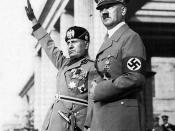"Everywhere in the world was heard the sound of things
breaking." Advanced European societies could not support long wars or
so many thought prior to World War I. They were right in a way. The
societies could not support a long war unchanged. The First World War
left no aspect of European civilization untouched as pre-war
governments were transformed to fight total war. The war metamorphed
Europe socially, politicaly, economically, and intellectualy.
European countries channeled all of their resources into total
war which resulted in enormous social change. The result of working
together for a common goal seemed to be unifying European societies.
Death knocked down all barriers between people. All belligerents had
enacted some form of a selective service which levelled classes in
many ways. Wartime scarcities made luxury an impossibility and
unfavorable. Reflecting this, clothing became uniform and
utilitarian. Europeans would never again dress in fancy, elaborate
costumes. Uniforms led the way in clothing change. The bright
blue-and-red prewar French infantry uniforms had been changed after
the first few months of the war, since they made whoever wore them
into excellent targets for machine guns. Women's skirts rose above
the ankle permanently and women became more of a part of society
than ever. They undertook a variety of jobs previously held by men.
They were now a part of clerical, secretarial work, and teaching.
They were also more widely employed in industrial jobs. By 1918, 37.6
percent of the work force in the Krupp armaments firm in Germany was
female. In England the proportion of women works rose strikingly in
public transport (for example, from 18,000 to 117,000 bus conductors),
banking (9,500 to 63,700), and commerce (505,000 to 934,000). Many
restrictions on women disappeared during the war. It became
acceptable for young, employed,



Not bad
pretty factual, but very intelligently written. Great formatting style.
4 out of 4 people found this comment useful.